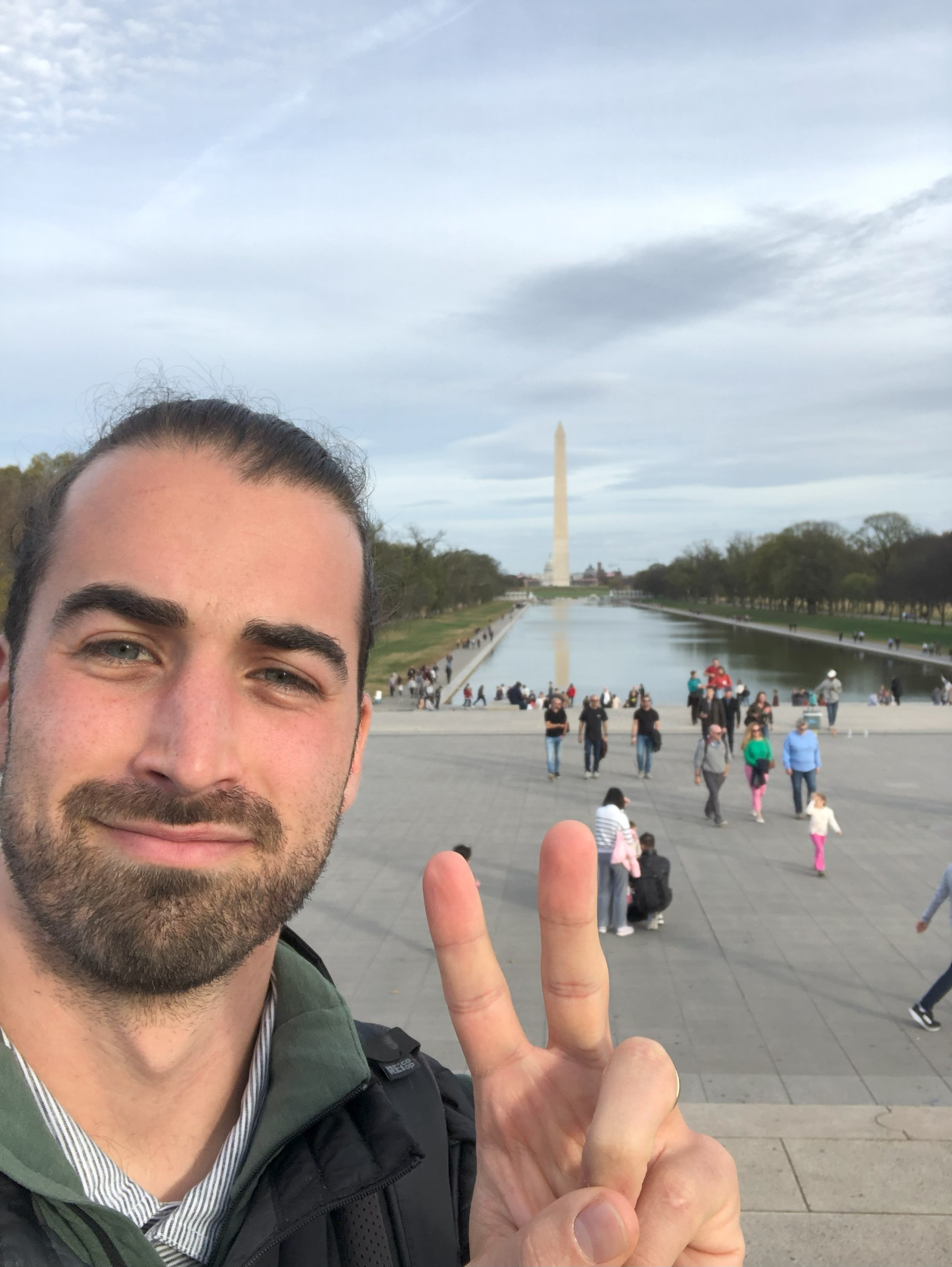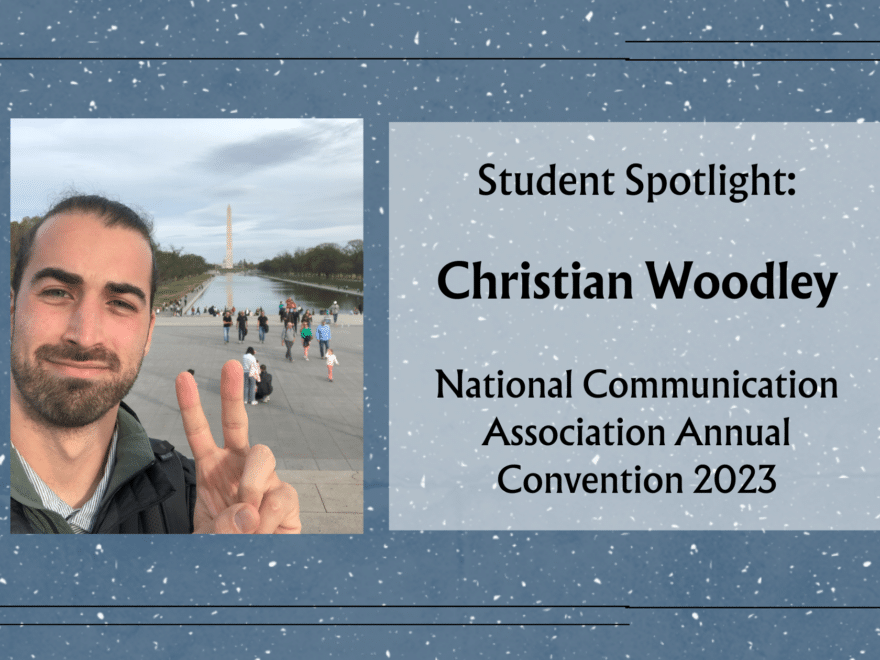For students and faculty at all levels, conferences offer the opportunity to present scholarship, learn about others’ work, and connect with fellow scholars.

Recently, MAWRD student Christian Woodley presented original work at the National Communication Association Annual Convention held in Washington, D.C. His research, which he presented as part of a panel on business communication, focused on the various ways online meetings impact interpersonal dynamics. Beyond his presentation, Christian connected with scholars, explored the city, and gained perspective on academic conferences more broadly.
Read on to hear more about Christian’s experience and his advice to students considering similar opportunities!
Grace Von Lehman: First, can you share a bit more about the conference you attended, and why you decided to submit your work to it?
Christian Woodley: I had a chance to present at the National Communication Association (NCA) Annual Convention. and I had actually presented there once before. When I was an undergrad senior, one of my professors encouraged me to submit a paper to NCA, and lo and behold I got accepted! After graduating, I started working in the professional world, but I was still able to take my paper to the convention and present it that fall.
From that experience several years ago, I was familiar with the conference, and last year another professor encouraged me to apply again. Since I am interested in pursuing a PhD and potentially becoming a professor, this seemed like a great stepping stone back into sharing my work. For me, presenting is a bit less daunting than submitting a paper to get published as an academic article, so I thought NCA would be a great opportunity.
I had one larger paper that seemed like a good fit, so over the course of last winter quarter I worked on it and had a couple of professors who very kindly worked with me and helped me edit, improve, and redirect that work toward the conference audience. I got accepted, and I had a great experience presenting!
GVL: It’s great to hear how much encouragement and support you received! Can you share more about the topic of your paper? You mentioned that you pivoted existing work toward a new audience for the conference – how did your work transform as you prepared to present it?
CW: The initial paper was one I wrote for the MAWRD Proseminar course, and it analyzed video conferencing and its usage in the business world. At the time I was more focused on tying this research to the requirements of the class, but as I revised it to submit to the conference, I had more freedom to pursue aspects I was especially interested in. Video conferencing is a topic I became passionate about particularly through my experiences working in the business world for 4 years and doing a vast majority of my work through video conferencing due to the pandemic.
Professor Julie Bokser, who taught my Proseminar course, was extremely helpful as I revised the paper to focus on a new audience–scholars of “business communication.” Specific revisions included adding other sources and cutting out some personal anecdotes from the original paper in order to fit more closely to conventions of academic writing. In the end, I titled the paper/presentation: “To Zoom or Not to Zoom: Video Conferencing and Its Implications in Business Communication.”
GVL: After revising your work, how was the experience of presenting it?
CW: I was on a panel that was focused on business communication with three other people, and we each got 10-15 minutes to present with 10-15 minutes at the end for the audience to ask any of us questions. Even though I presented on Saturday at 8:00 AM, there was a bigger audience than I expected (about 18-20 people), including some of my former professors.
During my time, I presented a slide show, starting with a summary of my arguments, defining the core questions I was asking in my research, and then analyzing the broader findings.
GVL: That sounds great! Were there any other sessions that you attended, or other moments that really stood out to you from the rest of the conference?
CW: Yes, I attended a handful of other sessions. There’s an overwhelming number of sessions at this convention–I think between ten and twenty sessions every hour, with four or five speakers in a typical session. So, it was a bit difficult to sort through all these options and decide which panels to attend, but I found several that really interested me and I was excited to join as an audience member. Actually, some of the presenters I saw were scholars whose work I had read in class, so it was really unique to be able to hear from them and connect with them as people rather than just through their academic prose on a page. I think that was the most unique thing.
More broadly, the ability that the conference provides to learn by osmosis was exciting for me. So much of the academic journey is reading words on a page or listening to lectures,where your professor is your main source of material and insight. Being at the conference with thousands of humans who all do this for a living just provided a very different feel for what the world of communication studies and of higher education in general can look like.
GVL: For undergrad or grad students who are interested in attending or presenting at conferences, do you have any words of wisdom?
CW: I think my general advice would just be to go for it! For most of us, the idea of presenting at a convention, especially as an undergrad or grad student, can be overwhelming or daunting. Or, you might think, “why would I do this work if I’m likely to just get rejected?” But I think that’s probably the wrong perception. It’s not that submitting to the conference or presenting was easy (and I can only speak from my experience), but I’ve been lucky enough to go twice and both times it seemed that everyone really appreciated having the perspective of students at these conferences. Also, you don’t have much to lose by throwing your name in the hat and just applying. If you don’t get accepted, you can try a different opportunity or still attend and learn from others.
The second piece of advice I would give is to ask for help and advice from your professors and mentors. When I decided to try for this opportunity, the faculty around me were really gracious in helping me. Jason Kalin, for instance, worked with me over Zoom and gave me feedback on several versions of my paper. Of course, that’s above and beyond what he gets paid to do on a daily basis, so it was really kind of him to help me, and I’m so grateful for how I grew as a scholar and writer throughout this collaborative revision process before even setting foot at the conference.
Finally, DePaul has a Graduate Research Fund (GRF) to help students have experiences like this. I was shocked by how helpful this was–I thought that I could maybe get a few hundred dollars to help cover some of the costs, but the GRF covered everything I asked for, including registration fees, airfare, and lodging, so the only cost that I ended up paying was for my meals at the conference. I hope that relieves some concerns that many people might have about cost being a barrier.
Interested in sharing your own work through conferences or publications? Check out this updated list of professionalization opportunities for undergraduate and graduate WRD students.
